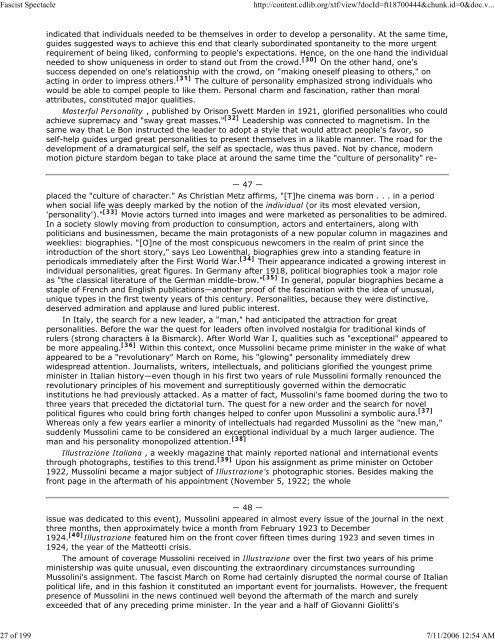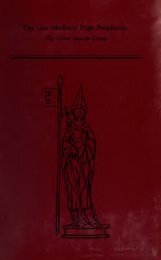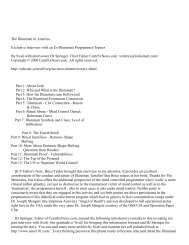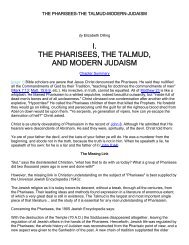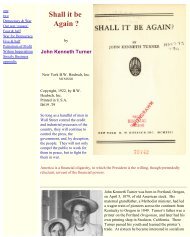Create successful ePaper yourself
Turn your PDF publications into a flip-book with our unique Google optimized e-Paper software.
<strong>Fascist</strong> <strong>Spectacle</strong> http://content.cdlib.org/xtf/view?docId=ft18700444&chunk.id=0&doc.v...<br />
indicated that individuals needed to be themselves in order to develop a personality. At the same time,<br />
guides suggested ways to achieve this end that clearly subordinated spontaneity to the more urgent<br />
requirement of being liked, conforming to people's expectations. Hence, on the one hand the individual<br />
needed to show uniqueness in order to stand out from the crowd. [30] On the other hand, one's<br />
success depended on one's relationship with the crowd, on "making oneself pleasing to others," on<br />
acting in order to impress others. [31] The culture of personality emphasized strong individuals who<br />
would be able to compel people to like them. Personal charm and fascination, rather than moral<br />
attributes, constituted major qualities.<br />
Masterful Personality , published by Orison Swett Marden in 1921, glorified personalities who could<br />
achieve supremacy and "sway great masses." [32] Leadership was connected to magnetism. In the<br />
same way that Le Bon instructed the leader to adopt a style that would attract people's favor, so<br />
self-help guides urged great personalities to present themselves in a likable manner. The road for the<br />
development of a dramaturgical self, the self as spectacle, was thus paved. Not by chance, modern<br />
motion picture stardom began to take place at around the same time the "culture of personality" re-<br />
― 47 ―<br />
placed the "culture of character." As Christian Metz affirms, "[T]he cinema was born . . . in a period<br />
when social life was deeply marked by the notion of the individual (or its most elevated version,<br />
'personality')." [33] Movie actors turned into images and were marketed as personalities to be admired.<br />
In a society slowly moving from production to consumption, actors and entertainers, along with<br />
politicians and businessmen, became the main protagonists of a new popular column in magazines and<br />
weeklies: biographies. "[O]ne of the most conspicuous newcomers in the realm of print since the<br />
introduction of the short story," says Leo Lowenthal, biographies grew into a standing feature in<br />
periodicals immediately after the First World War. [34] Their appearance indicated a growing interest in<br />
individual personalities, great figures. In Germany after 1918, political biographies took a major role<br />
as "the classical literature of the German middle-brow." [35] In general, popular biographies became a<br />
staple of French and English publications—another proof of the fascination with the idea of unusual,<br />
unique types in the first twenty years of this century. Personalities, because they were distinctive,<br />
deserved admiration and applause and lured public interest.<br />
In Italy, the search for a new leader, a "man," had anticipated the attraction for great<br />
personalities. Before the war the quest for leaders often involved nostalgia for traditional kinds of<br />
rulers (strong characters à la Bismarck). After World War I, qualities such as "exceptional" appeared to<br />
be more appealing. [36] Within this context, once Mussolini became prime minister in the wake of what<br />
appeared to be a "revolutionary" March on Rome, his "glowing" personality immediately drew<br />
widespread attention. Journalists, writers, intellectuals, and politicians glorified the youngest prime<br />
minister in Italian history—even though in his first two years of rule Mussolini formally renounced the<br />
revolutionary principles of his movement and surreptitiously governed within the democratic<br />
institutions he had previously attacked. As a matter of fact, Mussolini's fame boomed during the two to<br />
three years that preceded the dictatorial turn. The quest for a new order and the search for novel<br />
political figures who could bring forth changes helped to confer upon Mussolini a symbolic aura. [37]<br />
Whereas only a few years earlier a minority of intellectuals had regarded Mussolini as the "new man,"<br />
suddenly Mussolini came to be considered an exceptional individual by a much larger audience. The<br />
man and his personality monopolized attention. [38]<br />
Illustrazione Italiana , a weekly magazine that mainly reported national and international events<br />
through photographs, testifies to this trend. [39] Upon his assignment as prime minister on October<br />
1922, Mussolini became a major subject of Illustrazione's photographic stories. Besides making the<br />
front page in the aftermath of his appointment (November 5, 1922; the whole<br />
― 48 ―<br />
issue was dedicated to this event), Mussolini appeared in almost every issue of the journal in the next<br />
three months, then approximately twice a month from February 1923 to December<br />
1924. [40] Illustrazione featured him on the front cover fifteen times during 1923 and seven times in<br />
1924, the year of the Matteotti crisis.<br />
The amount of coverage Mussolini received in Illustrazione over the first two years of his prime<br />
ministership was quite unusual, even discounting the extraordinary circumstances surrounding<br />
Mussolini's assignment. The fascist March on Rome had certainly disrupted the normal course of Italian<br />
political life, and in this fashion it constituted an important event for journalists. However, the frequent<br />
presence of Mussolini in the news continued well beyond the aftermath of the march and surely<br />
exceeded that of any preceding prime minister. In the year and a half of Giovanni Giolitti's<br />
27 of 199 7/11/2006 12:54 AM


